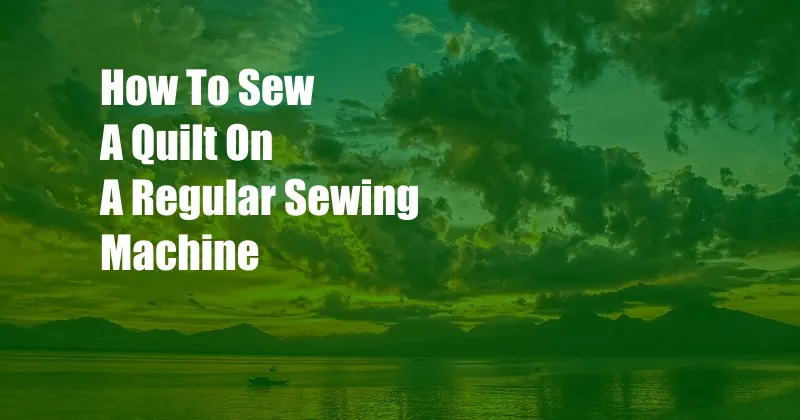
How to Sew a Quilt on a Regular Sewing Machine
Growing up, my grandmother was an avid quilter. I remember sitting in her lap, watching in amazement as she transformed scraps of fabric into beautiful works of art. One day, she asked me if I wanted to try making a quilt. I was excited to learn, but I was also intimidated. After all, quilting seemed like such a complex task.
My grandmother reassured me that it was easier than it looked. She showed me how to cut the fabric, sew the pieces together, and quilt the top. With her help, I created my first quilt, and I was so proud of it. Since then, I’ve made many more quilts, and I’ve learned a lot about the process. In this post, I’ll share my tips and expert advice for sewing a quilt on a regular sewing machine.
Choosing the Right Fabric
The first step in sewing a quilt is choosing the fabric. You can use any type of fabric, but some fabrics are better suited for quilting than others. Quilting cotton is a popular choice because it is durable, easy to work with, and comes in a wide variety of colors and patterns.
When choosing fabric for your quilt, keep in mind the overall design you want to create. If you’re making a traditional quilt, you may want to use fabrics with a classic print, such as calico or gingham. If you’re making a more modern quilt, you may want to use fabrics with bold colors and patterns.
Cutting the Fabric
Once you’ve chosen your fabric, you need to cut it into pieces. The size of the pieces will depend on the size of the quilt you want to make. For a baby quilt, you can cut the pieces into 5-inch squares. For a larger quilt, you can cut the pieces into 6- or 7-inch squares.
To cut the fabric, use a rotary cutter and a quilting ruler. This will help you to cut the pieces accurately and quickly. If you don’t have a rotary cutter, you can use a pair of scissors, but be sure to cut the pieces carefully.
Sewing the Pieces Together
Once you’ve cut the fabric, you need to sew the pieces together. To do this, use a sewing machine with a straight stitch. Start by sewing two pieces of fabric together, right sides together. Use a 1/4-inch seam allowance.
Once you’ve sewn the two pieces together, press the seam open. Then, sew the next piece of fabric to the first two pieces, again using a 1/4-inch seam allowance. Continue sewing the pieces together until you have a quilt top.
Quilting the Top
Once you have a quilt top, you need to quilt it. Quilting is the process of sewing the quilt top to a layer of batting and a layer of backing fabric. This helps to keep the quilt warm and durable.
There are many different ways to quilt a quilt. You can hand-quilt it, machine-quilt it, or tie it. If you’re a beginner, I recommend machine-quilting your quilt. This is the easiest method and it will give you a professional-looking finish.
Binding the Quilt
Once you’ve quilted the quilt, you need to bind it. Binding is the process of sewing a strip of fabric around the edges of the quilt. This helps to protect the edges of the quilt and gives it a finished look.
To bind the quilt, use a bias tape maker to create a strip of bias tape. Then, sew the bias tape around the edges of the quilt, using a blind stitch.
FAQ
Q: What is the best type of fabric for quilting?
A: Quilting cotton is a popular choice because it is durable, easy to work with, and comes in a wide variety of colors and patterns.
Q: What size should I cut the fabric pieces?
A: The size of the fabric pieces will depend on the size of the quilt you want to make. For a baby quilt, you can cut the pieces into 5-inch squares. For a larger quilt, you can cut the pieces into 6- or 7-inch sqaures.
Q: How do I quilt the quilt top?
A: There are many different ways to quilt a quilt top. You can hand-quilt it, machine-quilt it, or tie it. If you’re a beginner, I recommend machine-quilting your quilt. This is the easiest method and it will give you a professional-looking finish.
Conclusion
Sewing a quilt on a regular sewing machine is a rewarding experience. With a little practice, you can create a beautiful quilt that will be treasured for years to come. I encourage you to give it a try.
Are you interested in learning more about quilting? If so, I encourage you to check out the following resources:
–The American Quilting Society
–Quilting in Style
–
Categories Blog